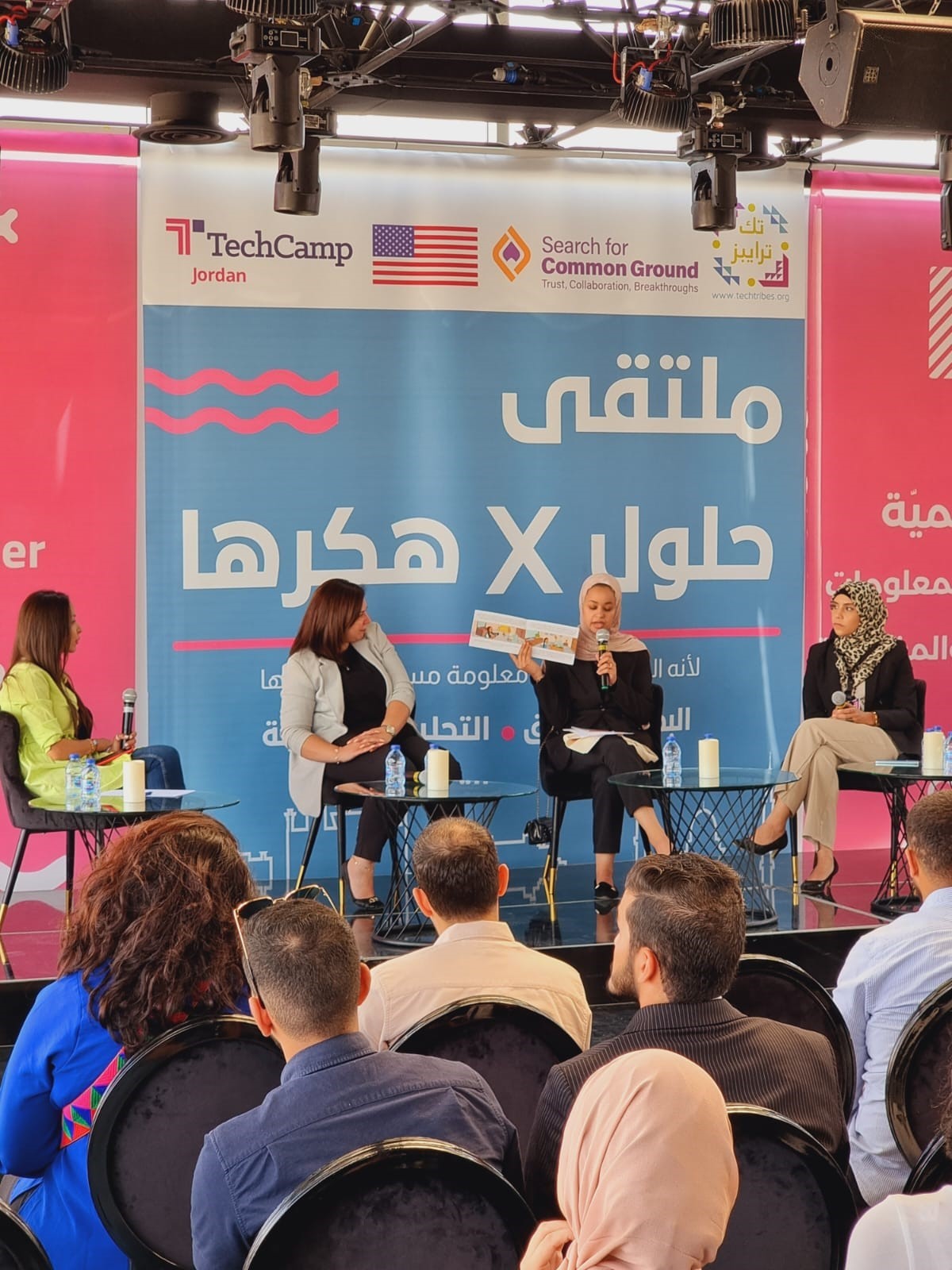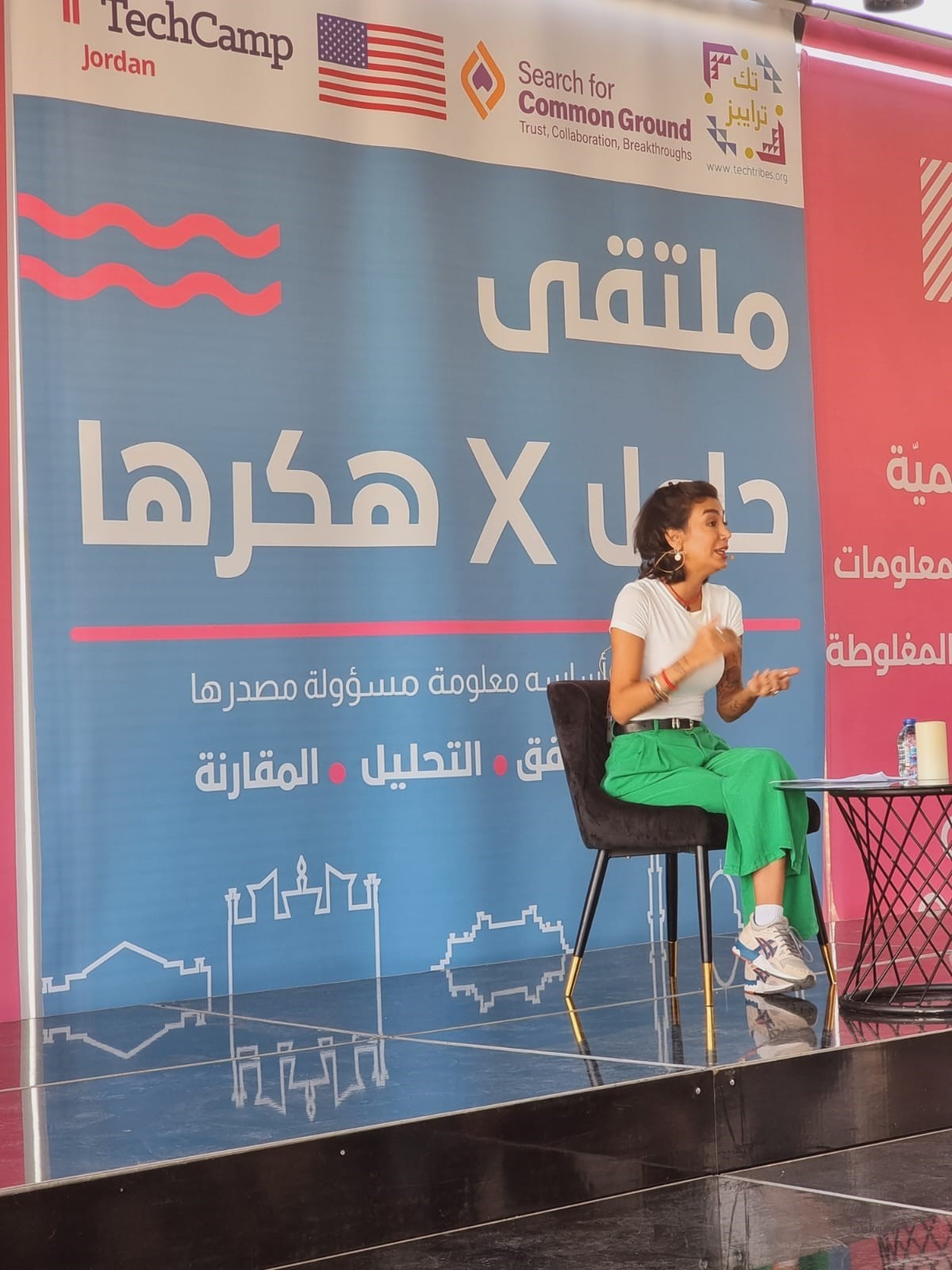AMMAN —
HoloulXHakkerha Project, an initiative exploring the means to finding
innovative solutions to misinformation and disinformation through
youth empowerment and tech-based solutions began in October 2021 with a group of 35
people.
اضافة اعلان
The summit, held
on Thursday at The Space by Ferras, shared the nine findings and solutions of a
four-day bootcamp conducted by TechCamp Jordan through immersive dialogues and
panel sessions. Bootcamp participants (aged 18–35) were young leaders already
working on tech-based initiatives.
Supported by the
US Department of State and implemented by Search for Common Ground in
collaboration with Tech Tribes, the summit was split into two panel sessions —
each focusing on different solutions — and an open discussion with Salam
Katanani, a science content creator.
“At Search for
Common Ground, digital peace building is something we have been investing in. A
lot of our programs are youth focused. … This project allowed us to support
young people to understand and utilize their skills, while also building on
these skills to come up with digital products that address issues that they
face themselves, and their communities face as well,” Search for Common Ground
Country Director Aya Abu Sitteh told
Jordan News.
The program
model adopted feasible approaches, according to Khaled Hijab, the executive
director of Tech Tribes. “We adapted it (the program model) to something that
really works, to something that the youth actually understand and want to
consume, and it fits the local market.”
“This program is
unlike traditional approaches that try to engage youth through governance or
the labor market at large. This one (HoloulXHakkerha) came in with knowledge
and education that participants need to own responsibility for how they want to
develop their own ideas and understanding,” he said.
Digital literacy and content creation
The first panel session, moderated by Hijab, focused largely on the
importance of enriching Arab content creation and the necessity of improving
digital literacy, alongside the discussion of two initiatives created at the
camp.
Literacy
Specialist and Trainer Bayan Al-Tal discussed with participants the importance
of the national strategy that offers a comprehensive educational curriculum for
schools in digital literacy from KG2 till Grade 12.

Saja Abu Zaideh,
representing “Cyber Clinic”, a HoloulXHakerha startup, discussed the importance
of practicing cyber security and the role of the startup in promoting these
practices. Through Cyber Clinic, five awareness videos were created. These
videos were largely targeted towards children as their use of the internet is
more “random”, said Zaideh.
Alongside Zaideh
was Sewar Taweel with the “Ask a Doctor” startup. Ask a Doctor is a
four-episode video series that addresses the wide medical misinformation found
online. The videos starred two puppets Hadi and Hala, a married couple who both
notoriously use the internet to diagnose issues and find untested herbal
solutions and mixtures.
“The reason we
used dolls is because they feel closer to people,” Taweel told the panel. “The
use of puppets allowed us to simplify the content to reach as many people as
possible.”
Also during the
panel, Thair Kisswani a digital activist and content creator with Peace Geeks,
addressed the importance of invigorating social media and other digital platforms
with Arabic content. “Many people in the Arab world only speak Arabic,” he
said, emphasizing that the lack of Arabic content gives them a disadvantage of
restricted access to information online that bilingual speakers might not face.
At Search for Common Ground, digital peace building is something we have been investing in.
On the importance
of Arabic content, Hijab, the executive director of Tech Tribes, told
Jordan
News: “Tech Tribes, right from the start was a good fit for the project
because we as an organization that focus on supporting young entrepreneurs,
with a focus on social entrepreneurs, have took it on our behalf to contribute
to the creation of Arabic content that supports youth.”
“The issue of
overflow of information in English has already been addressed. We wanted to
create curricula and support in the form that suits the context and is
understandable and easily digestible by people in the region,” he added.
Youth participation, and well-being initiatives
The second panel, moderated
by
Journalist Ghada Al Sheikh, discussed working towards a more responsible
digital media space and discussed the ethics and practices of such space.
Discussions on the importance of innovative youth participation and flexibility
in journalism was also a key discussion point.
Rawan Jayousi,
director of Madraj Foundation for Digital Media Entrepreneurship, discussed the
creation of a new digital ecosystem where journalistic ethics are changing due
to the large change of engagement amongst youth.
In light of
restrictions on journalistic freedoms and the lack of accurate information
outlets, Jayousi emphasized that “there is a new generation that is able to use
the new tools to break these barriers and is capable of presenting sensitive
and new content.”

Zummoruda, a
HoloulxHakkerha startup that focuses on menstrual education through digital (QR
codes) and printed knowledge guides supplemented with videos, photos, and
infographics. The startup focused on addressing stigma and misinformation
around the menstruation cycle, especially in Mafraq governorate. The startup
also included an initiative to distribute sanitary products in the governorate.
While discussing
content creation, especially productive content creation, Bayan Sabra from
Zummoruda, emphasized that social media, especially for youth, is a place “they
escape to, so it is no surprise that the content they consume is not high in
value.”
“When we went to
Mafraq we tried as much as we can to ensure that the session was not purely
informational. … We need to try and find a balance and create content that is
engaging,” she added.
Expanding the
emphasis on well-being, Ruba El Shoushi launched the “No filter” startup, which
targets 12–18 years old. The startup seeks to target misinformation and
disinformation circulated by influencers on social media platforms.
“No Filter is no
longer just a need, it is a must. … Influencers are lacking fact checking
tools, and audiences are also lacking these tools. Through this initiative we
are trying to empower youth to be able to distinguish fact from deceptiveness
while also engaging in content creation,” said Shoushi.
“Through
engaging influencers with content consumers, influencers are able to share
their struggles with the consumers, which is important since they are usually
seen as though they are living an easy life and their lifestyle is great. When
in reality they might be facing struggles,” she added.
The summit concluded
with an open discussion with Katanani and Abu Sitteh, Search for Common Ground
country director, emphasizing that the summit and its startups were “just the
beginning”.
Read more Features
Jordan News



